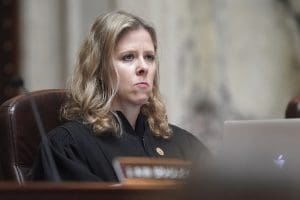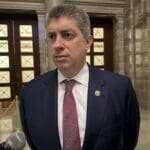Wisconsin Supreme Court's absentee ballot drop box ban fuels election conspiracy theories
‘There’s no question that this is aimed to make disabled people, elderly voters, and absentee voters in general vote less,’ one voting rights advocate said.

On July 8, the Wisconsin Supreme Court ruled in a 4-3 decision that the state’s 570 ballot drop boxes violated state election law and, in a portion of the decision supported by just three of the justices, that the results of the 2020 election were consequently untrustworthy, a declaration that election conspiracy theorists and former President Donald Trump were quick to celebrate.
In Teigen v. Wisconsin Elections Commission, the plaintiffs, two Wisconsin voters represented by the conservative legal nonprofit Wisconsin Institute for Law and Liberty, argued that the drop boxes violated the state’s election statutes, which they said require that voters personally deliver their ballots to a municipal clerk or mail them in.
The conservative majority agreed with the plaintiffs that any method besides those stipulated fall outside of the delivery methods allowed by law and barred the further use of drop boxes. But Justice Rebecca Bradley took the opportunity to declare the 2020 presidential election in the state “unlawful.”
Bradley, who in 2020 authored the dissent in Biden v. Trump — a suit brought by former President Donald Trump that aimed to throw out all of Wisconsin’s absentee ballots and deny President Joe Biden the state’s 10 electoral votes — described the results of the 2020 election as “unlawful” and “illegitimate”. She even seemed to compare the United States to North Korea and Syria as nations where dictators cling to power through fraudulent elections.
“Throughout history, tyrants have claimed electoral victory via elections conducted in violation of governing law,” Bradley wrote in the opinion.
Ann Walsh Bradley, one of the court’s liberals, excoriated the majority’s opinion in her dissent, writing that it “blithely and erroneously seeks to sow distrust in the administration of our elections and through faulty analysis and erects yet another barrier for voters.”
The seven sitting justices are elected in nominally nonpartisan elections and serve 10-year terms. Justice Patience Roggensack, a conservative who ruled with the majority, is up for reelection in 2023.
Jay Heck, executive director of Common Cause Wisconsin, told the American Independent Foundation the Wisconsin Supreme Court’s ruling will fall especially hard on disabled, elderly, and rural voters who rely on intermediaries to deliver their ballot, comes less than a month before the state’s Aug. 9 primary elections.
The government watchdog is advising voters to follow the letter of the court’s decision.
“What we’ve decided to do is advise people, certainly for the upcoming August primary, that people vote according to what the Supreme Court ruled, which is return your own absentee ballot and put it in your mailbox yourself,” Heck said. “If that’s going to cause some trouble, then call your election clerk or call the Wisconsin Disability Coalition and they’ll find a way to get your ballot delivered. But there’s no question that this is aimed to make disabled people, elderly voters, and absentee voters in general vote less.”
The two leading Republicans running in the primary for their party’s gubernatorial nomination, former Lt. Gov. Rebecca Kleefisch and businessman Tim Michels, both issued statements that day lauding the decision, and Trump said Wisconsin Republicans should decertify the 2020 election results. Trump endorsed Michels after he surged in the polls.
On Tuesday, Michels refused to rule out the possibility of signing a bill that would decertify the 2020 election.
“You know, I have to work with the Legislature and see what these bills look like,” Michels told a reporter for local news station WKOW at a campaign stop. “As a businessman, I just don’t say that I’ll do this or I’ll do that. It’s always about the details.”
Pro-Trump figures prominent in the election denial movement celebrated the court’s ruling and said it vindicated their debunked claims of election fraud, including Dinesh D’Souza and Mike Lindell. The latter of the two used it as an opportunity to push for an illegal retroactive decertification of the 2020 election.
Tom Fitton, the president of the conservative legal group Judicial Watch, also issued a statement supporting the court’s ruling, calling it a “historic vindication for Trump.”
Over the weekend, false claims circulated on Twitter and Facebook that the U.S. Supreme Court had overturned the 2020 election. It was unclear if those claims were at all related to the Wisconsin ruling.
“The real tragedy here is that officers of the court in the state of Wisconsin are giving fertile ground for supporters of the Big Lie to continue misleading the public about a free and fair election,” Scott Thompson, an attorney with the progressive nonprofit legal group Law Forward told the American Independent Foundation.
Published with permission of The American Independent Foundation.
Recommended

Ohio Gov. DeWine said he didn’t know of millions in FirstEnergy support. Is it plausible?
Ohio Gov. Mike DeWine’s claim to not know about the millions an Akron utility spent supporting his 2018 campaign for governor simply isn’t credible, an Ohio political scientist said in a recent interview. A spokesperson for DeWine pushed back. FirstEnergy provided that support, then spent more than $60 million to pass and protect a $1.3 billion ratepayer-financed […]
By Marty Schladen, Ohio Capital Journal - April 29, 2024
Missouri governor hopeful Bill Eigel rejects affordable childcare proposal
Eigel has previously supported stripping funds from public schools and once opposed an expansion of early kindergarten.
By Jesse Valentine - April 15, 2024
Montana Gov. Greg Gianforte hosts event with religious extremist
J.P. De Gance is the founder of Communio, an organization that uses social media marketing tools to push a far-right agenda.
By Jesse Valentine - March 27, 2024







































































